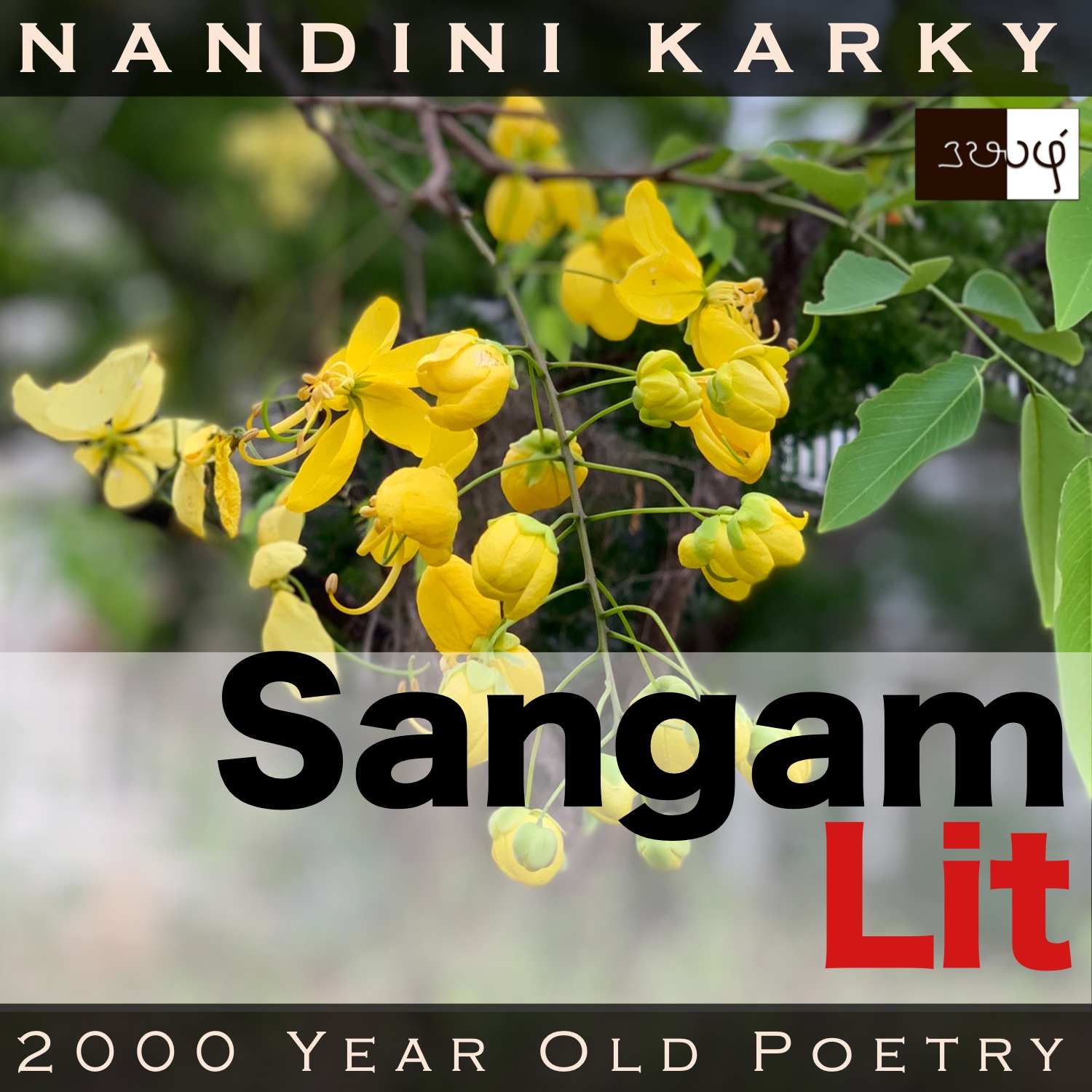Podcast: Play in new window | Download
Subscribe: Apple Podcasts | Spotify | Amazon Music | Android | iHeartRadio | TuneIn | RSS | More

In this episode, we relish stacked similes that tell us a tale of parting, as depicted in Sangam Literary work, Kurunthogai 148, penned by Ilankeeranthaiyaar. Set in the forest regions of ‘Mullai’, the verse speaks in the voice of the lady to her confidante, in response to her friend’s consolation about the man’s return.
செல்வச் சிறாஅர் சீறடிப் பொலிந்த
தவளை வாஅய பொலம் செய் கிண்கிணிக்
காசின் அன்ன போது ஈன் கொன்றை
குருந்தொடு அலம்வரும் பெருந் தண் காலையும்,
”கார் அன்று” என்றிஆயின்,
கனவோ மற்று இது? வினவுவல் யானே.
The verse makes a strong statement about the season. In the opening words ‘செல்வச் சிறாஅர் சீறடி’ meaning ‘tiny feet of children from wealthy families’, we glimpse one of those rare references to children in Sangam verses. Next, we turn to nature in ‘தவளை வாஅய’ referring to ‘a frog’s mouth’. It’s back to wealth in the words ‘பொலம் செய் கிண்கிணிக் காசு’ which means ‘coins in the anklets, made of gold’. Through this expression, I learnt of a new word for ‘gold’ in ‘பொலம்’ and an ancient gold ornament called as ‘Kinkini’ worn on the feet, with a circle of round golden fittings that drop down and clang together when the person wearing it moves. An excellent choice for busy parents to keep a watch on their curious toddlers! From objects, the focus turns to nature in the mention of two trees ‘கொன்றை’ or ‘golden shower tree’ and ‘குருந்து’ or ‘wild lemon tree’. I read that the other Tamil names for this ‘Kurunthu’ tree are ‘Kolunji’ and ‘Narangam’ and is said to be a tree found in the forests of Tamilnadu with a spiky round lemon fruit and white flowers. Ending with the words ‘வினவுவல் யானே’ meaning ‘I ask you’, the verse intrigues our curiosity.
After those references to golden objects, frogs and trees, what could be the vehement question put forth? The context reveals that the man and lady were leading a happy married life when the man parted away to gather wealth. Before he leaves, he promises the lady he would be back before the rains. One day, the lady turns to her confidante and says, “The little feet of wealthy children are adorned by frog-mouthed golden ‘kinkini’ anklets. Akin to the coins on this anklet, fresh buds have bloomed on the ‘kondrai’. The ‘kondrai’ along with the ‘kurunthu’ dances on this moist and cool morning. If you still say, ‘It’s not the rainy season yet’, then I ask you, ‘Is this a dream?’” With these words, the lady refuses to accept the words of consolation, rendered by her confidante, who was saying that the rainy season had not yet arrived and that the man would be back as he promised.
I’m not fooled by your empty assurances, seems to be the tone of the lady. She starts by focusing her lens on the feet of wealthy children. What could be the significance of this adjective – ‘wealthy’? We learn soon enough, for she reveals the golden ornament that these children are wearing on their feet. If even the little ones are wearing golden ornaments, that too on their feet, the families must be rolling in wealth, no doubt. Beckoning our attention to the shape of this anklet, she says how these anklets have an opening like a frog’s mouth. The curved lines around a frog’s mouth are equated to the elliptical shape of these anklets. After that delightful comparison, the lady moves on to the tiny objects that are attached to the elliptical centrepiece of this anklet and relates how these are similar to the young, yellow buds of the golden shower tree. And, there we have, a connection of a single object to two different elements in nature – a frog’s mouth and a tree’s buds. Yet another illustration of the creativity in Sangam perspectives!
Returning to the verse, the lady has mentioned the golden buds of the ‘Kondrai’ only to say how that tree, along with ‘Kurunthu’ seems to be swaying intensely. If these trees are dancing, then there must be a strong gust of wind and the lady declares that this wind too is filled with moisture on that morning. After stating these facts, the lady turns to her confidante and says that even now her friend was insisting the rainy season had not arrived and so she asks indignantly, ‘Then, what is all this happening around us? A mere dream or what?” With that sharp question, the lady declares that she’s not consoled by the friend’s words that the man would return as promised. In many other Sangam poems we have seen how the confidante consoles the lady saying that the trees or peacocks are foolish mistaking the slight change in weather for the rainy season. At these times too, we wondered if the lady is fooled by these compassionate but inaccurate words. In this verse, we have our answer. The lady seems to be more of a person of logic, who says the golden shower tree is blooming and swaying with the wild lime and asks her friend, how can you declare that the rains were still not there. In the end, the verse depicts a subtle struggle between truth and kindness, a conflict that we face in our interactions with others even today.




Share your thoughts...